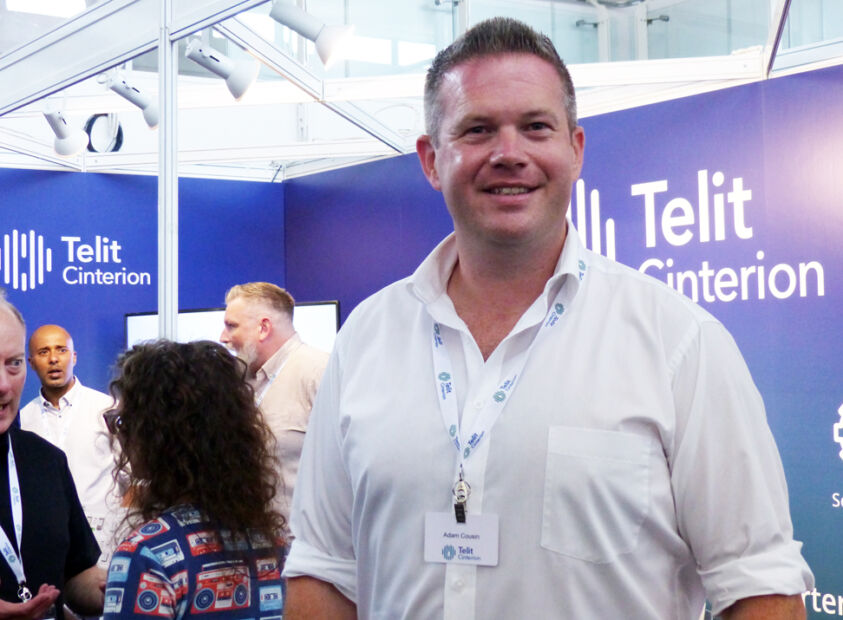What is going on at Telit?
- July 14, 2023
- Steve Rogerson
- Telit Cinterion
Steve Rogerson talks with Adam Cousin from Telit about the recent changes seen by the company.

Everybody in the IoT industry must have noticed big changes going on at Telit, with its acquisitions last year of the Thales IoT business and Mobilogix, and the recent sale of its automotive module unit to Kontron. And, of course, the name change to Telit Cinterion.
So, I decided to take the opportunity at this week’s Hardware Pioneers Max show in London to have a chat with the company’s business development director Adam Cousin to find out just what is going on.
First, some background. In August last year, Telit announced it was buying California start-up Mobilogix hot on the heels of its acquisition in July of the Thales Cinterion IoT business, which would become a combined company called Telit Cinterion, the branding of which was unveiled at this year’s Mobile World Congress. In July this year, it sold its automotive business to German embedded computer company Kontron.
To start, let’s get this name change out of the way. What has become the norm for acquisitions these days is for the buying company to pay homage to the acquired company’s name and then slowly, or sometimes quickly, bury it; at best it will become a brand or product name. What you don’t expect is for it to become part of the main company’s name.
“Cinterion has some pedigree,” said Adam. “The name holds gravitas. It is well respected. It is important that their legacy is not gone. And it is important that this is seen as a merger to form something that is stronger than its constituent parts.”
With this name change has come a new way of working. Gone is the broad-brush approach that characterised Telit’s marketing in the past to a more focused concentration on the different verticals.
“We will drill down on key vertical so we can really understand the nature of these markets,” said Adam.
Take energy for example. Whereas the Telit modules will find their way into smart meters, the market is so much more than that with energy suppliers, smart grids, heat pumps and so on.
“It is fundamental that we understand the ecosystem,” he said. “This means we can better serve the meter manufacturers with our technology. No meter manufacturer decides on its own what module technology to use. That is being done higher up the food chain, so we want to understand the full market.”
Part of this change has been to adopt a more as-a-service model, which came in part with the acquisition of Mobilogix and a change in the way the market is now working with more technical support needed before and after a sale.
“Once, you could buy a module, SIM and platform and stick them together and it worked,” said Adam. “Now it is more complex, with roaming, cloud platforms, security. It is not easy to buy three things and put them together. It doesn’t work at all. So, we adopted a consultative approach. It is easier for us to put something together for the customer’s needs that will work. They don’t need to talk with different vendors. Having this under one roof is a powerful position.”
He said the company could also provide an ODM services, which again came with the Mobilogix acquisition.
This all provides a much faster time to market for Telit’s clients and elevates Telit from being a component supplier to being a device supplier.
“We don’t want to address the end markets of our customers, but we can assist them with turnkey offerings so they can go and address these markets,” said Adam. “This is an enormous change for us. We have to be massively change-agile. It is not easy. We don’t talk about modules anymore, we talk about challenges, needs and the end application, and from that we deliver what the customer needs.”
The Cinterion acquisition also brought with it an automotive module business, which Telit has ditched with remarkable speed by selling it off to Kontron. This seems a strange move give the growing use of technology in automotive; surely having a ready-made automotive division would be ideal. Kontron certainly thinks so.
“This allows us to focus on pureplay IoT,” said Adam. “Automotive is interesting but is a very difficult market that doesn’t align very well with a pureplay IoT company. With automotive, you have to make special modules and deal with longevity, different standards and so on. That is not really what we do.”
This was not always the case. Telit did once have its own dedicated automotive division, but it sold that years ago.
“We made the decision to move away from automotive years ago,” he said, “so when the acquisition included their automotive division, we decided to offload. It is a very different market to industrial. The features list for automotive is very different to industrial. The industrial market is enormous and it is growing, and if we are to focus on that then we had to make a decision.”
These acquisitions have led to some job losses, but Adam would not be drawn on the details.
“When you smash two companies together, you have double of everything, so we have to put the best of what we have in the right place,” he said. ‘There has to be some staff shrinkage, but we prefer to look at the two companies’ market strategies in different areas. This has given us a stronger market share.”
• Read more about Hardware Pioneers Max here.




